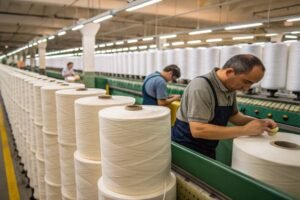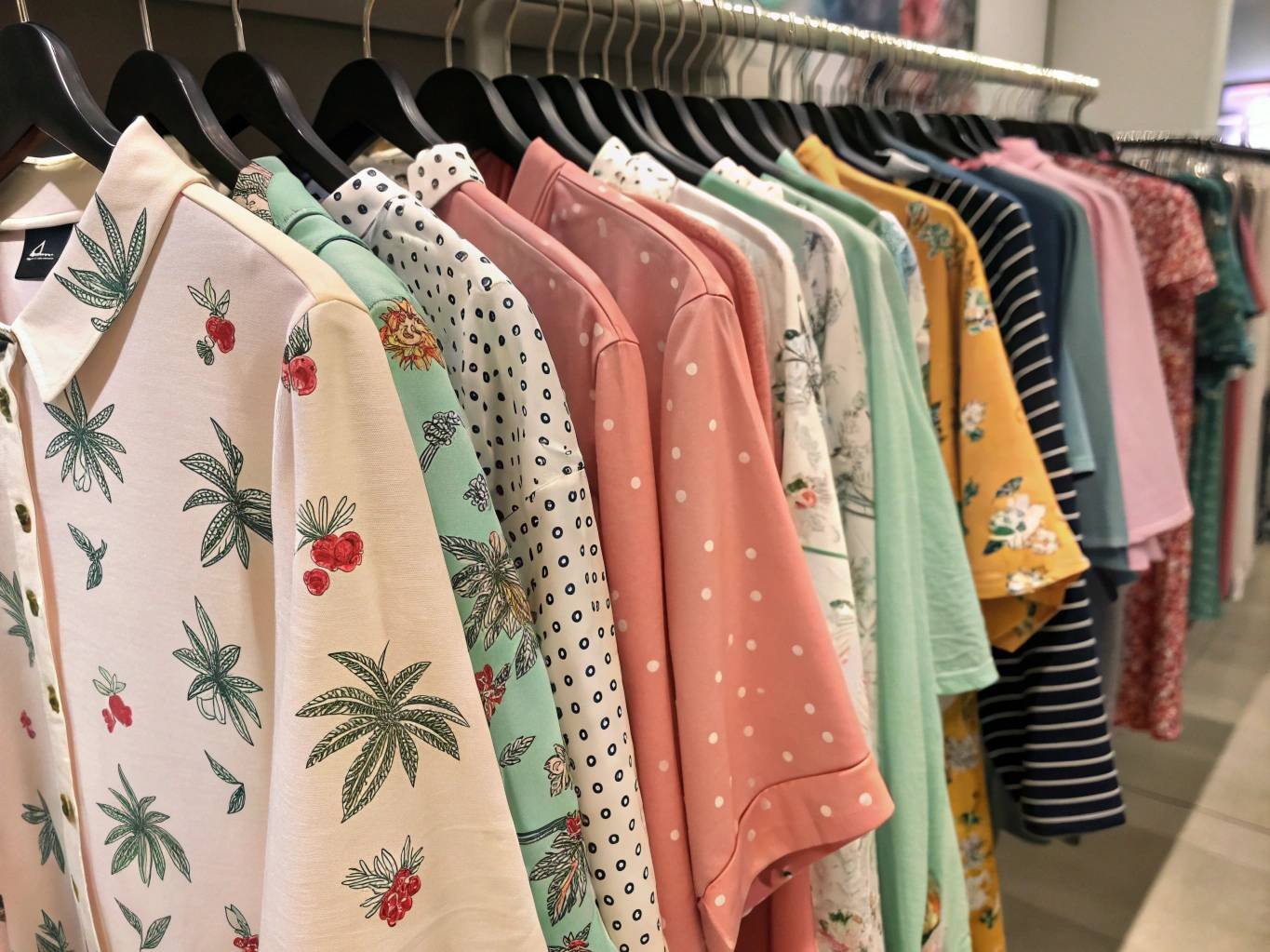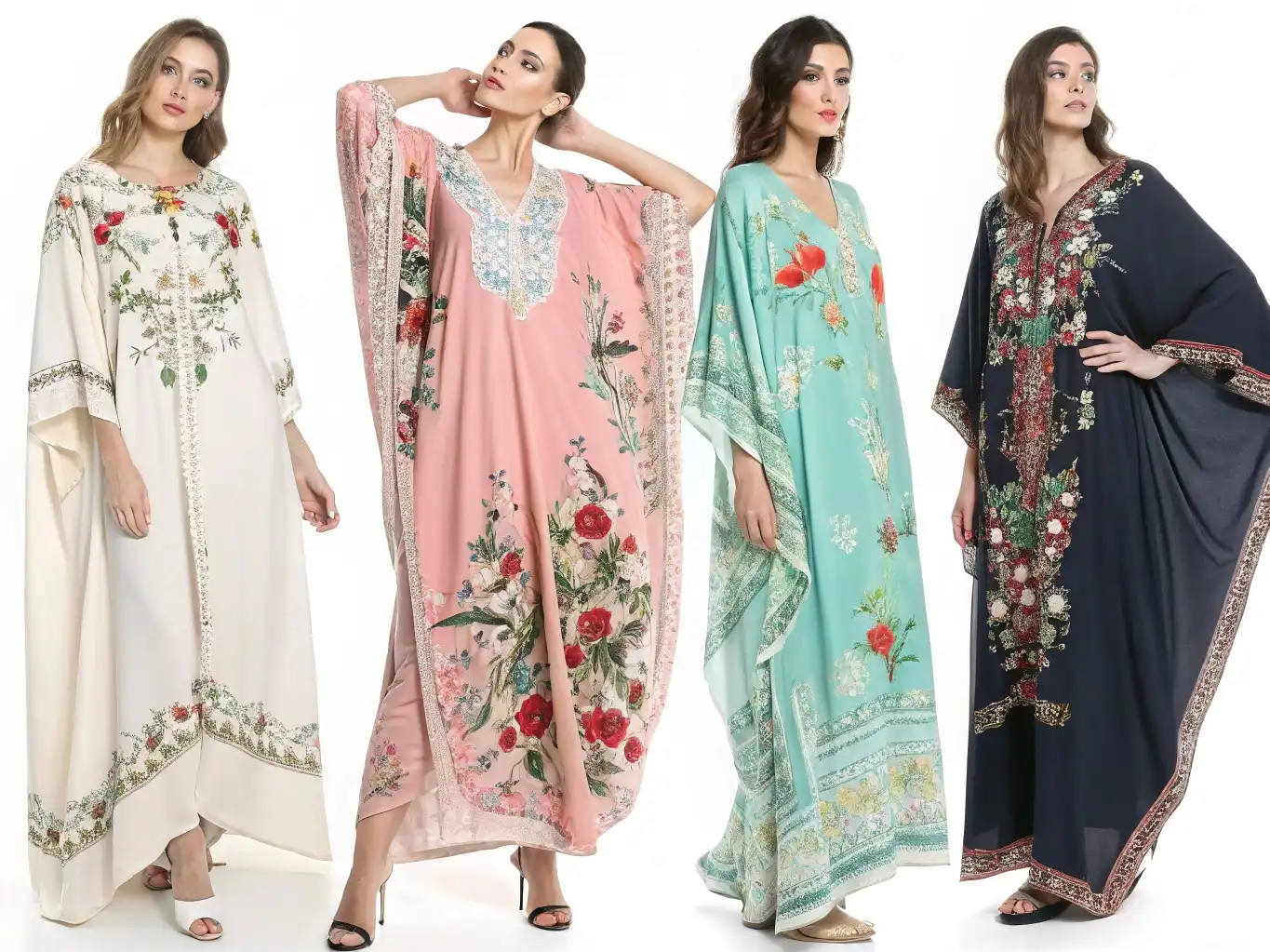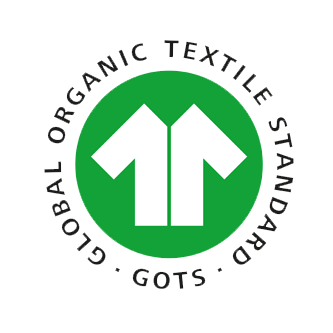Portugal’s textile industry is renowned worldwide for producing high-quality fabrics that have earned the country a place among the top textile manufacturers. From luxurious wool and cashmere1 to durable cotton and linen, Portuguese clothing manufacturers offer a range of premium fabrics2 that are sought after by international fashion brands. Understanding the unique fabrics that Portugal is famous for and how they’re used in high-end clothing production can help brands make informed decisions when sourcing materials.
This guide explores the key fabrics produced by Portuguese manufacturers, why they stand out in the global market, and how you can work with Portuguese suppliers for your clothing line.
What Are the Key Fabrics Produced by Clothing Manufacturers in Portugal?
Portugal’s textile industry is diverse, producing a wide range of high-quality fabrics. Among the most popular are cotton, wool, cashmere, linen, and denim. These fabrics are prized for their durability, comfort, and luxurious feel. Portuguese manufacturers are skilled in weaving and finishing these textiles to meet the demands of high-end fashion brands across the globe.
Portugal’s expertise in fabric production is driven by both tradition and innovation, creating textiles that balance luxury with functionality.
 Workers Managing Yarn in a Textile Factory
Workers Managing Yarn in a Textile Factory
Key fabrics produced by Portuguese manufacturers:
| Fabric Type | Key Characteristics | Uses in Clothing Production |
|---|---|---|
| Cotton | Soft, breathable, and durable | Premium shirts, dresses, and activewear |
| Wool & Cashmere | Luxuriously soft, insulating, and moisture-wicking | Sweaters, coats, scarves, and suits |
| Linen | Lightweight, breathable, and eco-friendly | Summer apparel, casual wear, and resort wear |
| Denim | Strong, versatile, and often treated for unique finishes | Jeans, jackets, and casual wear |
How Is Portuguese Cotton Used in High-Quality Clothing Production?
Portuguese cotton is highly regarded for its softness, durability, and smooth texture. It is often used by top-tier fashion brands for producing shirts, blouses, and other garments that demand both comfort and style. The cotton is woven with a finer finish, making it ideal for creating premium-quality, breathable apparel that stands the test of time.
Portugal’s cotton fabrics are perfect for high-end, breathable garments that require both elegance and durability.
| Key Feature | Description | Why It’s Preferred |
|---|---|---|
| Softness | Portuguese cotton is spun to a finer finish, resulting in a smooth, luxurious feel. | Ideal for creating comfortable clothing that feels soft on the skin. |
| Durability | Known for its long-lasting nature, Portuguese cotton is resistant to wear. | Perfect for garments that need to withstand frequent use while maintaining their appearance. |
| Breathability | The natural breathability of cotton keeps wearers cool and comfortable. | Essential for creating garments that offer comfort in both warm and cooler climates. |
What Makes Portuguese Wool and Cashmere Stand Out in the Fashion Industry?
Portugal is a key producer of fine wool and cashmere. Portuguese wool is known for its exceptional softness and warmth, while Portuguese cashmere is prized for its lightness and luxurious texture. These fabrics are used in high-end garments such as sweaters, coats, and scarves. The meticulous weaving and finishing processes applied to these fabrics ensure that they retain their quality over time, making them a favorite of luxury fashion brands.
Portuguese wool and cashmere are sought after for their softness, warmth, and ability to create garments that are both stylish and functional.
| Key Feature | Description | Why It’s Preferred |
|---|---|---|
| Softness | Both wool and cashmere from Portugal are exceptionally soft, offering a luxurious feel. | Provides comfort and warmth without bulk. |
| Insulating Properties | Portuguese wool is an excellent insulator, while cashmere provides warmth in a lightweight form. | Perfect for creating premium outerwear and knitwear. |
| Durability | These fabrics maintain their shape and softness after repeated use and washing. | Ideal for luxury items that require longevity. |
Why Is Portugal Known for Its Textile Industry?
Portugal’s textile industry is one of the most advanced in Europe, with a rich history of textile production that stretches back centuries. The country’s combination of traditional techniques and cutting-edge technology has made it a global leader in fabric manufacturing, particularly in high-end and luxury textiles.
The country’s focus on quality, sustainability, and innovation has allowed it to maintain a strong position in the global textile market.
Why Portugal is known for its textile industry:
| Factor | Description | Why It’s Important |
|---|---|---|
| Tradition and Craftsmanship | Portugal has a long history of producing high-quality textiles, using both traditional and modern techniques. | Offers unmatched expertise in weaving, dyeing, and finishing fabrics. |
| Innovation and Technology | Portuguese manufacturers embrace new technology to improve fabric quality and production efficiency. | Ensures that Portugal stays competitive and can meet global demand. |
| Sustainability | Many Portuguese textile manufacturers focus on eco-friendly practices, such as using organic fibers and sustainable dyes. | Aligns with the growing consumer preference for sustainable fashion. |

How Do Portuguese Clothing Manufacturers Combine Tradition and Innovation?
Portuguese manufacturers are known for their ability to combine traditional craftsmanship with modern manufacturing techniques. This blend allows them to create textiles that are both timeless and cutting-edge, using eco-friendly practices and the latest technologies to produce high-quality fabrics that are durable and sustainable.
By balancing tradition with innovation, Portuguese manufacturers are able to produce fabrics that are both luxurious and efficient.
| Combination Factor | Description | Why It’s Effective |
|---|---|---|
| Traditional Weaving Techniques | Skilled artisans use centuries-old weaving techniques to produce high-quality fabrics. | Ensures fabrics are rich in texture and detail. |
| Modern Technology | New technology such as automated weaving and digital printing enhances production efficiency. | Increases production speed while maintaining fabric quality. |
| Eco-Friendly Production | Manufacturers integrate sustainable practices, such as using organic fibers and eco-friendly dyes. | Meets the demand for environmentally-conscious fabrics while maintaining quality. |
What Role Do Sustainability and Eco-Friendly Fabrics Play in Portugal’s Textile Industry?
Sustainability is a major focus for many Portuguese textile manufacturers. The industry has seen a shift toward producing eco-friendly fabrics3, such as organic cotton and recycled polyester, and using sustainable production methods. These eco-friendly practices not only appeal to environmentally conscious consumers but also align with global trends toward reducing environmental impact.
Portugal’s dedication to sustainability has made it a leader in producing eco-friendly textiles.
| Sustainability Factor | Description | Why It’s Important |
|---|---|---|
| Eco-Friendly Materials | Many manufacturers use organic fibers, such as organic cotton and linen. | Reduces the environmental footprint and supports sustainable fashion. |
| Efficient Production | Portuguese manufacturers focus on minimizing waste and reducing energy consumption in production. | Helps lower the carbon footprint and ensures eco-conscious manufacturing processes. |
How Do Portuguese Manufacturers Contribute to the Global Clothing Market?
Portuguese manufacturers are well-regarded in the global market for their high-quality fabrics and efficient production processes. Portugal exports textiles to various countries, serving high-end fashion brands with fabrics that meet their strict quality standards.
The country’s strong reputation for producing premium fabrics2 has made it a key player in the global clothing market.
Portuguese manufacturers’ global contributions:
| Contribution | Description | Why It Matters |
|---|---|---|
| Global Exports | Portugal exports textiles to countries around the world, especially to Europe and North America. | Ensures a steady supply of high-quality fabrics to international brands. |
| Luxury Fashion | Many luxury fashion brands use Portuguese textiles for their collections. | Elevates Portugal’s status in the high-end fashion industry. |
How Is Portuguese Fabric Used by Leading International Fashion Brands?
Portuguese fabric is highly valued by international fashion houses for its quality and versatility. Brands like Hugo Boss, Zara, and Massimo Dutti use Portuguese textiles in their collections, particularly for premium shirts, coats, and denim jeans.
Portuguese fabric’s reputation for luxury and durability has made it a favorite among top-tier fashion brands.
| Brand | Portuguese Fabric Used | Why It’s Chosen |
|---|---|---|
| Zara | Cotton, wool, denim | For everyday wear and seasonal collections. |
| Hugo Boss | Wool, cashmere | For premium suits, outerwear, and scarves. |
| Massimo Dutti | Linen, cotton | For high-quality shirts, pants, and jackets. |
What Are the Benefits of Sourcing Fabrics from Portuguese Manufacturers?
Sourcing fabrics from Portugal offers numerous advantages, including access to premium textiles, a commitment to sustainability, and reliable production. Portuguese manufacturers also offer competitive pricing while ensuring high-quality materials and timely delivery.
Working with Portuguese manufacturers ensures you receive high-quality textiles that are durable, versatile, and ethically produced.
| Benefit | Description | Why It’s Valuable |
|---|---|---|
| High-Quality Fabrics | Portuguese fabrics are known for their exceptional quality and durability. | Ensures that your products meet high standards and last longer. |
| Sustainability | Many Portuguese manufacturers focus on sustainable practices in textile production. | Appeals to eco-conscious consumers and supports your brand’s sustainable image. |
What Are the Most Popular Fabrics Made in Portugal?
Portugal produces several fabrics that are highly regarded for their quality and versatility. Among the most popular are linen, denim, cotton, and wool. These fabrics are commonly used in clothing collections that prioritize both style and functionality.
Each of these fabrics is used in various applications, from summer wear to premium denim, making them staples in the global fashion industry.
Most popular fabrics made in Portugal:
| Fabric Type | Key Characteristics | Uses in Clothing Production |
|---|---|---|
| Linen | Lightweight, breathable, and eco-friendly | Summer apparel, casual wear, and resort wear |
| Denim | Durable, versatile, and often treated for unique finishes | Jeans, jackets, skirts, and casual wear |
How Is Linen Used by Clothing Manufacturers in Portugal for Summer Apparel?
Linen is a popular fabric produced in Portugal, especially for summer apparel. It is lightweight, breathable, and naturally eco-friendly, making it perfect for warm weather clothing. Portuguese linen is known for its softness and ability to keep the wearer cool in hot temperatures.
Linen’s natural properties and sustainable production make it ideal for creating stylish, comfortable summer clothing.
| Key Feature | Description | Why It’s Preferred |
|---|---|---|
| Breathability | Linen is highly breathable, making it perfect for warm climates. | Ensures comfort during the hot summer months. |
| Sustainability | Made from the flax plant, linen is more sustainable compared to other fabrics. | Appeals to environmentally conscious consumers. |

What Makes Portuguese Denim a Preferred Choice for Quality Jeans?
Portuguese denim is known for its strength, durability1, and luxurious feel. The country’s denim is often treated with unique finishes, making it ideal for producing high-quality jeans. Many international fashion brands use Portuguese denim due to its long-lasting nature and high-end finish.
Portuguese denim offers an exceptional combination of durability and style, making it the fabric of choice for premium denim garments.
| Key Feature | Description | Why It’s Preferred |
|---|---|---|
| Durability | Portuguese denim is tough and designed to withstand frequent use. | Ideal for producing long-lasting jeans and jackets. |
| Softness | Despite its durability, Portuguese denim is soft to the touch. | Provides a comfortable fit without compromising on strength. |
How Can You Work with Clothing Manufacturers in Portugal?
Portugal’s textile industry is renowned for producing high-quality fabrics2. If you’re interested in incorporating Portuguese textiles into your clothing line, it’s essential to understand the process of working with Portuguese fabric suppliers and manufacturers.
Partnering with the right Portuguese manufacturers can help ensure that your garments meet the highest standards of quality.
Working with Portuguese manufacturers:
| Step | Description | Why It’s Essential |
|---|---|---|
| Choosing the Right Supplier | Select a manufacturer who specializes in the fabrics you need. | Ensures that you’re working with experts who understand the fabric’s characteristics. |
| Collaborating on Custom Designs | Clearly communicate your design requirements and expectations. | Ensures that your designs are realized accurately and efficiently. |
What Should You Look for When Choosing a Portuguese Fabric Supplier?
When selecting a Portuguese fabric supplier, it’s crucial to assess their reputation, sustainability practices, and ability to meet your production timelines. Working with an experienced supplier ensures you receive high-quality materials and reliable service.
Choosing the right supplier ensures that your brand receives the best possible fabrics and support.
| Key Factor | Description | Why It’s Important |
|---|---|---|
| Reputation | Look for manufacturers with a strong track record in the textile industry. | Guarantees quality and reliability in fabric production. |
| Sustainability Practices | Choose manufacturers who use eco-friendly processes and materials. | Aligns with global consumer trends toward sustainability. |
How Do You Navigate the Process of Manufacturing Custom Clothing with Portuguese Manufacturers?
Working with Portuguese manufacturers involves clear communication, a strong design process, and understanding the capabilities of your chosen supplier. Regularly communicate with your supplier, request samples, and clarify all terms to ensure your custom clothing is produced to your standards.
Collaboration and clear communication with Portuguese manufacturers will help bring your designs to life with high-quality materials.
| Step | Description | Why It’s Essential |
|---|---|---|
| Design Specifications | Provide detailed design documents and materials for each garment. | Ensures accuracy and prevents production errors. |
| Quality Control | Work with your manufacturer to establish quality control processes. | Guarantees that every piece meets your brand’s standards. |
Conclusion
Portugal’s textile industry stands as a global leader in producing high-quality fabrics, combining centuries-old traditions with modern innovation. From luxurious wool and cashmere to durable cotton, linen, and denim, Portuguese manufacturers offer fabrics that cater to various fashion needs, from high-end apparel to sustainable collections.
The country’s commitment to sustainability, coupled with its expertise in fabric production, makes it an ideal source for brands seeking premium textiles. By understanding the fabrics that Portugal is famous for and how to work with local manufacturers, you can elevate your clothing line with materials that are not only high-quality but also aligned with modern consumer values.
Whether you’re sourcing fabrics for a luxury line or creating eco-conscious apparel, Portuguese textiles offer a combination of durability, innovation, and craftsmanship that is unmatched. Partnering with Portuguese manufacturers is an investment in quality that will help your brand stand out in the competitive fashion market.
Good luck with your fabric sourcing and brand development—Portugal’s textiles are ready to be part of your success!









